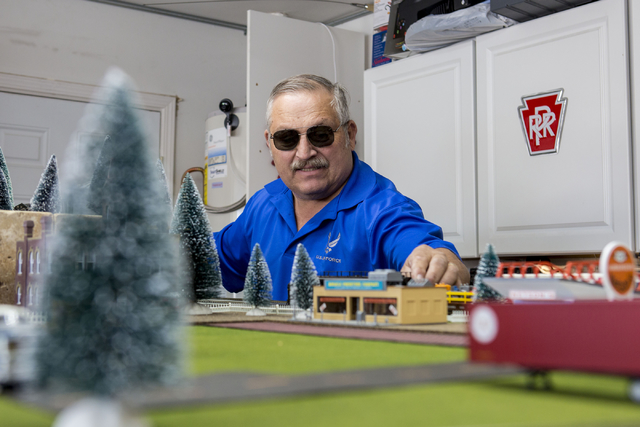2 heart attacks spur former Air Force cop to mellow out

Jim Henry’s model railroad trains zip past him as he stands next to the tiered 80-square-foot layout he’s created in his North Las Vegas garage.
The sound of train whistles remind him of growing up in western New York, when he used to ride Pennsylvania Railroad trains engineered by his father.
“This is always a work in progress,” the 61-year-old Henry says as his eyes follow a locomotive around the track. “My grandson loves it, and I find it nice and calming.”
Calming, stress relieving — things Henry appreciates more and more in the wake of two heart attacks since 2010.
Today, he finds the opportunity to develop his own railroading empire a labor of love — one that includes using his knowledge of railroad history to develop structures, terrain and scenery that make part of his boyhood come alive.
“I’m learning to slow down,” says Henry, who retired from the U.S. Air Force Security Police as a tech sergeant in the ’90s. “It’s amazing what you notice when you slow down. Last year I was on a trail at Zion National Park and I noticed all the different smells of the flowers and trees, saw deer bedded down. It was wonderful.”
While all of us baby boomers have to be concerned about heart health — it’s the leading cause of death for both men and women older than 60 — Henry understands that with his family and professional background, he probably should be even more aware of what, and what not, to do.
His father died at 49 of a heart condition.
“It’s always in the back of mind,” Henry says.
So is the death of an Air Force colleague from suicide. Henry later escorted the body home.
That experience resulted in a PTSD diagnosis and professional treatment for stress that continues today.
“You have to let some things go, not dwell on them, but it’s easier said than done,” he says.
Henry’s first heart attack occurred in 2010, not long after he had helped erect a basketball net for a grandson. The second attack occurred in 2014 as he slept. After each event, he had stents put in to improve blood flow.
“The doctors say my problem is with my blood vessels,” he says. “My heart’s operating at about 60 percent now.”
After his Air Force career — his assignments included stints at Nellis Air Force Base and in Turkey when terrorism was erupting in Europe — Henry worked at an area paper company until he had to leave on medical disability.
“I watch what I eat now — no more fried foods, and more veggies and fruits,” he says. “And Anne (his wife) and I go for walks a lot.”
No longer does he allow himself to get involved in arguments that could increase his stress.
“I just walk away.”
During the holidays, Henry and his wife are spending more time with children and grandchildren, and planning their next big motorcycle trip on a Honda trike.
“Anne relaxes so much on those trips that sometimes she’ll fall asleep, sitting behind me.” Henry laughs.
Jim Krokker and Dan McGillivray, who’ve both accompanied Henry on motorcycle trips across the country, say they’ve noted how their friend has changed since his heart attacks.
“He’s definitely eating better,” McGillivray says.
“And he’s not volunteering as much,” says Krokker, who recalls how Henry would always find a way to provide a motorcycle escort for charity events.
Henry is doing all he can to prevent another heart attack.
“I’m doing my part to live,” he says. “I’m lucky that I have family to enjoy.”
Paul Harasim’s column runs Sunday, Tuesday and Friday in the Nevada section and Monday in the Health section. Contact him at pharasim@reviewjournal.com or 702-387-5273. Follow @paulharasim on Twitter.